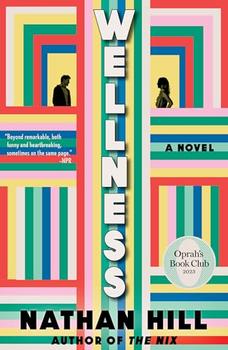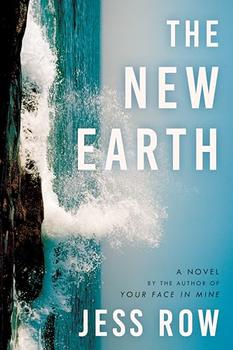Summary | Excerpt | Reading Guide | Reviews | Beyond the book | Read-Alikes | Genres & Themes | Author Bio

A Novel
by Nathan HillNathan Hill's second novel, Wellness, follows Jack and Elizabeth, an ambivalent and disillusioned married couple in their late thirties. The two met in Chicago in 1993; they were eighteen years old and lived in pre-gentrified Wicker Park, where Jack took photographs of the neighborhood's indie rock scene and Elizabeth, a freshman in college, was voraciously studying "the whole human condition." Now, in 2014, they're surprised by where their paths have led them: Jack is an adjunct photography professor, Elizabeth runs a grifter behavioral psychology company, and they're preparing for a move to the suburbs. Somewhere along the line, bit by bit, they sold out.
The novel's title refers to the name of Elizabeth's company, but it's also a promise of critique, a sendup of reality in 2014, especially compared to the optimistic counterculture and nascent internet of the '90s. Hill starts out strong in this vein, setting up a slightly exaggerated and askew world: Jack and Elizabeth's son has to be put to bed with the words "Don't forget to subscribe"; Jack, to be healthier, has gone on something called "the System," in which an orange wristband tells him not only how to exercise and eat but also when to have sex and how to improve his marriage; and his university has started calculating an "impact algorithm," which pays professors based on their online presence. These are not laugh-out-loud jokes, but you could call them skewering—of the business of higher ed, of our optimization culture and dependence on smartphones, and so on.
But Hill's heart isn't in satire. He's more interested in setting up personalities and exploring family dynamics. The marriage at the core of the book is a recognizable type, and Jack and Elizabeth know it. "I'm just worried that somewhere along the way I turned into this person I never intended to be, this person that Elizabeth never expected to be married to, this, like, boring vanilla toxic untalented gentrifier," Jack tells a friend. When Elizabeth doesn't want to have sex with Jack, she feels guilty: "She hated being that person: the dowdy, exhausted wife who says no. What a cliché."
These characters never fully transcend their archetypical quality, but Hill does a good job of fleshing them out. Elizabeth's ambivalence about marriage and parenthood, her vague desperation to bring back the spark of youth, seemed to me well-rendered, even if Hill's roaming third-person narration keeps us at arm's length. A few characterizations made me laugh in recognition, as in the description of Elizabeth's stubborn independent streak:
It was one of her pet peeves, that thing that happens to couples when they stop saying "I" in favor of "We," as if they'd developed a shared couple-brain… Jack would sometimes say "What do we want for dinner tonight?" and she'd stare and him and say "I know what I want for dinner. What do you want for dinner?"
As a portrait of a modern marriage, it's not the most complex or unique, but it's compelling. And one reason it is so compelling—so breezy and digestible—is that it's filled with pseudo-scientific theories, anywhere on the spectrum from crackpot to plausible, about why society is the way it is, and why the human brain and body work the way they do. Elizabeth uses evolutionary psychology to explain her mid-life unhappiness: historically, the fragile young and old had to be content enough to stay put and not take risks, she reasons, while the middle-aged people needed to feel antsy enough to go off into the dangerous world and get stuff done. Kate and Kyle, Silicon Valley transplants in an open marriage, do some surface-level psychoanalysis on Jack and Elizabeth's relationship, then use similar evo psych logic to explain their scorn for monogamy: for most of human history, the average relationship only lasted eight years, so humans are hardwired to feel attached for that long and no longer. Kyle adds that the human penis is shaped like a plunger, a form that evolved to suck out other men's sperm, evidence that women have always slept around and therefore monogamy is unnatural.
These explanations read like the chapters of Freakonomics or someone talking about love languages—the kind of fun, facile logic that seems plausible in the moment but is ultimately too simple to encompass the complexity of human behavior. Hill wants to poke at it, to show us that it can be both absurd and compelling, that it can make good fiction. And of course he includes the more sinister, antisocial theories that have gained footholds online. An old friend of Jack's has become a Joe Rogan prototype, drinking raw hydrogen water and railing against the "trash-garbage that comes out of the tap." A new friend of Elizabeth's, an unhappy suburbanite, believes that "one's energy sent vibrations out into space-time that produced either positive or negative changes in one's own reality."
Hill's own theory, evidenced also by his debut novel, The Nix, is that we can understand our present selves by understanding our pasts. That's why he gives us ample episodic flashbacks that shed new light on what we've already read, showing Elizabeth and Jack's lives to be more painful, or fraudulent, or complicated than we'd previously realized, and in so doing, creating a kind of unified theory of their lives. We get long scenes of Jack's upbringing on the Kansas prairie and Elizabeth's rich-kid one in suburban New England, plus a history of Elizabeth's con men ancestors and a chilling set piece about Facebook algorithms. Some parts are more interesting than others (is there anything worse than picking up a novel about the complexities of adult life and having to read about AP classes and SAT scores?), but one could thumb through this book and find any number of standalone episodes to reread.
It's conventional wisdom that one's childhood affects their adult relationships and parenting style, and so all of these scenes are, in theory, worthwhile. And yet when taken all together, the result ends up seeming almost as facile as the theories Hill lampoons. Wellness' structure is too neat, too symmetrical; there is too straight and solid of a line between past and present. Real life doesn't work like that; and even if it did, it'd be boring to write about. The many good parts of Hill's novel understand this, that anyone who feeds you easy answers is probably selling something, or at least underestimating you. The interested reader should read Wellness like they would a daily horoscope or pop psychology—as food for thought, for entertainment, for flashes of recognition, but without the expectation of great truths.
![]() This review
first ran in the October 4, 2023
issue of BookBrowse Recommends.
This review
first ran in the October 4, 2023
issue of BookBrowse Recommends.

If you liked Wellness, try these:

by Taffy Brodesser-Akner
Published 2025
An exhilarating novel about one American family, the dark moment that shatters their suburban paradise, and the wild legacy of trauma and inheritance, from the New York Times bestselling author of Fleishman Is in Trouble.

by Jess Row
Published 2024
A globe-spanning epic novel about a fractured New York family reckoning with the harms of the past and confronting humanity's uncertain future, from award-winning author Jess Row
Your guide toexceptional books
BookBrowse seeks out and recommends the best in contemporary fiction and nonfiction—books that not only engage and entertain but also deepen our understanding of ourselves and the world around us.